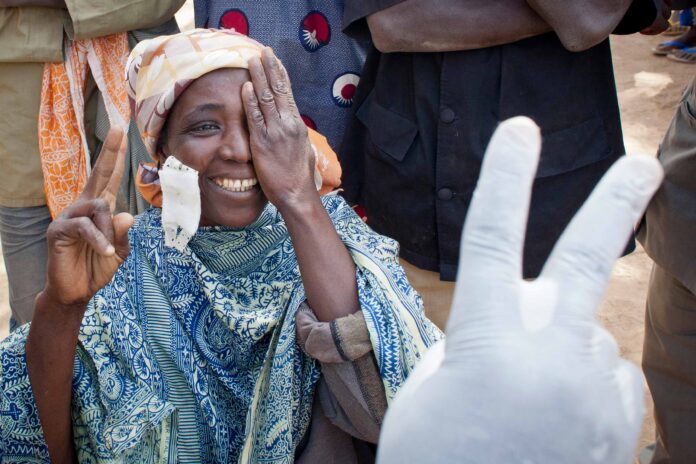Eye health crisis in Nigeria will spiral if we don’t act now, says new campaign In Nigeria, the number of people in need of eye care is spiralling. In 2007, it was estimated that among people aged 40 years and over, around 1.1 million were blind and over 403,000 were severely vision impaired1.
With expanding populations, it is expected that these numbers would be significantly higher today. This is a global problem, not just a regional one, and it is estimated that without concerted action the number of people who are blind across the world could triple by 2050.
Good eye health has a ripple effect on society, improving education, wellbeing, economics, and health outcomes.
This World Sight Day (13 October), through its new ‘Eye health Equals’ campaign, international development organisation Sightsavers is calling on governments, organisations, donors, and communities to ensure eye health is prioritised.
Sightsavers is also holding various activities to highlight the importance of eye health:
Eye health screenings at the national assembly, in partnership with the Federal Ministry of Health and the Federal Capital Territory Authority.
Eye health education, screenings, and provision of spectacles for drivers in motor parks in Abuja, in partnership with the Federal Ministry of Transport.
Launching an inclusive eye care project with CBM in Plateau State and providing free cataract surgery for 150 adults in the remote communities of Shendam, Mangu and Pankshin.
Dr Selben Penzin, Senior Program Manager for Eye Health at Sightsavers, said: “The government and other organisations are already working hard to improve eye health, but we cannot afford to be complacent and must build on recent successes.
For example, an eye health policy has been approved by the government, but this needs to be translated into action to ensure no Nigerian is deprived of quality eye health.
“The eye health crisis is not inevitable; we can stop it if we come together to act now. By increasing the attention eye care is given, recognising how integral it is to every facet of life, and focusing on gender and disability inclusion, we will reduce inequality and help achieve the United Nations’ Sustainable Development Goals.
”The importance of eye health can be seen through stories such as 12-year-old Asmau from Zaria. Nearly every member of her family has experienced visual impairment, and her mother and several siblings have all had cataract surgery.
Asmau was unable to write at school due to vision impairment and had difficulties reading and helping at home. Thanks to support from players of People’s Postcode Lottery in Great Britain, A G Leventis Foundation and Spectrum, she had cataract surgery as part of a Sightsavers child eye health project.
“Before the surgery I didn’t see at all, but now when I sit in front I can see what’s written on the board…I am very thankful to God for my ability to see better now, unlike before. I feel happy.
”In Nigeria, Sightsavers is working with the government and other partners to improve access to eye health services and cataract surgery for children in northwest Nigeria. It is also improving access to eye health services for marginalised people and people with disabilities in Kogi State, and in underserved areas of Plateau State.
Dr Sunday Isiyaku, Country Director for Nigeria, Sightsavers adds: “The United Nations’ Sustainable Development Goals mention leaving no one behind, but there are still many people in that position. If we are to tackle the eye health burden in Nigeria, continued cross-sector collaboration, well-resourced interventions, funding, and commitments are needed to integrate inclusive eye health into wider health, education, employment, and development systems.
“We need all stakeholders, particularly the government and professional bodies, to rise to the challenge and meet the demand for services in the country.
”Sightsavers ‘Eye health equals’ campaign and World Sight Day activities complement the wider International Agency for the Prevention of Blindness (IAPB) call this World Sight Day to ‘love your eyes’ and focus the world’s attention on the importance of eye care.


